Spycraft by ThisIsNoZaku
| 1 | Introduction |
| 2 | Character Creation |
| 3 | Skills |
| 4 | Feats |
| 5 | Gear |
| 6 | Combat |
Introduction
Original SA postTime to
 it up.
it up.
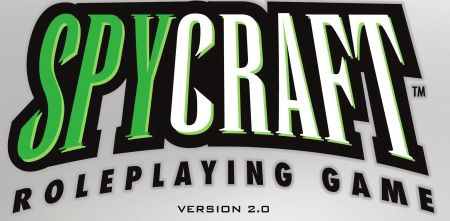
Spycraft is a pair of games based on D20, the first edition of which was printed in 2002, the second in 2005, both by AEG. Due to financial difficulties, AEG axed the line shortly after the release of second edition, but three of the writers got together to form Crafty Games and negotiated the license from AEG to keep the game in print. They've since gone on to reprint Spycraft 2.0 (with some improved organization, but with B&W printing of an all-color design
 ), and released Fantasy Craft, their take on D&D style fantasy and also a D20 derivative; the licensed Mistborn RPG; and Little Wizards, an expanded English edition of a French game (Fun fact:
the designer of that game is also a boardgame designer with several well-regarded gamed, including 7 Wonders and Ghost Story.
).
), and released Fantasy Craft, their take on D&D style fantasy and also a D20 derivative; the licensed Mistborn RPG; and Little Wizards, an expanded English edition of a French game (Fun fact:
the designer of that game is also a boardgame designer with several well-regarded gamed, including 7 Wonders and Ghost Story.
).
Spycraft 2.0 doesn't start with the usual “What is roleplaying?” bit lots of games have, instead talking about it's own history, some of the design behind it and differences between it and its predecessor.
The game let's us know we have a
license to improvise!
Spycraft wants to be the "ultimate modern genre toolkit" game; it defaults to the superspy action genre but can be modified for everything from “gritty, hard-edged techno thriller” to “campy, gonzo martial arts epics”. This means it has intricate mechanics to cover lots of situations so
 s need never be without the cold comfort of math.
s need never be without the cold comfort of math.
What's Different?
We get descriptions of how Spycraft 2.0 differs from both the D20 OGL and the original Spycraft.
Differences from D20:
No Multiclassing XP Penalties
(Who even used those anyway?)
No Attacks of Opportunity
No Challenge Rating
(A brand new system for creating encounters and challenges is included)
Vitality and Wounds
(Spycraft uses “action movie near-miss” Vitality points and “real meat damage” Wound points in lieu of D&D hit points)
New Skill System
(Modified skills for the modern genre)
Action Dice
(The “heroes edge,” usable sort of like fate points/hero points/story points/etc in lots of other games)
Error Ranges
(The failure equivalent of critical threat ranges)
And here’s another important difference, hinted at in that last entry: In most of the d20 system, a roll can have two results: success or failure. Combat adds “super success” critical hits, and it’s a common house rule to add in “fumble” effects on a roll of 1 with an attack, while a few places here and there give bad results on a 1 as well.
Spycraft adds
four
extra possible results on rolls pretty much everywhere throughout the system. If you roll a number within your Threat Range, you get a “Threat,” a sort of exceptional success. You can then spend an Action Die to turn it into a super awesome Critical Success. On the flip side, rolling within your Error Range is a really bad failure called an “Error,” and an enemy (the Game Control if a player rolled it, a player if the GC did) can spend an Action Die to turn it into a Critical Failure. These can all occur on skill checks, combat rolls and more. There’s all kinds of effects that can fiddle with these ranges and the amount of Action Dice needed.
Also, the Game Control is the Spycraft version of the Dungeon Master, if you hadn't guessed.

This is the only picture in this section
Differences from 1.0:
I have no familiarity with first edition, these taken straight from the list in the book.
Campaign Qualities
(Mechanics for customization to fit a campaign)
Origins
(Replaces “Departments,” which served as an equivalent of races in D&D)
New Gear System
(A radical departure from the traditional method of handling equipment)
Improved Gadgets
(Player customized items)
Dramatic Conflicts
(Subsystems for things like hacking, seduction, manhunts and interrogation)
Expert Class Prerequisites
(The Prestige Class equivalent, now easier to enter than ever)
Interests
(Replaced a skill with a more robust system for peripheral character hobbies)
Subplots
(Character specific story lines)
Combat
(Modified for
 greater realism
greater realism
 )
)
Stress Damage
(Mechanics for psychological stress and trauma)
Subdual Damage
(Non-lethal injury)
NPC Design
(Modular system for everything from mooks to supervillains)
Mission Design
Character Creation
Original SA post
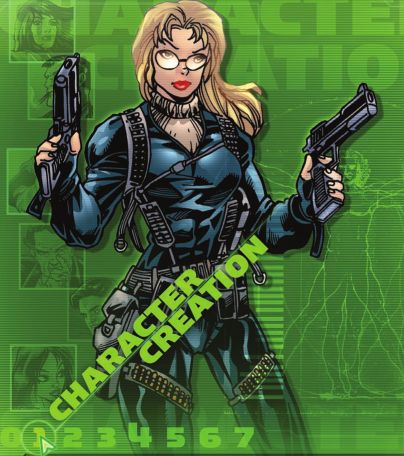
The powerful librarian/superspy multiclass combo
The first mechanics we run into are character creation .
Before actual character creation starts however, the Game Control needs to select the Campaign Qualities they want based on the type of game they want to run. For new GCs, the book suggests the hybrid and revolving door qualities, which allow a combination of independent Freelance and “company men” Faction characters working together plus very forgiving death rules.
The first step of creating a character is the concept. An important question to answer is whether the character works for an organization or is freelance.
Next is Attributes. Pretty much the same as in D20, with a few additions for the different setting and added rules (Strength for handling recoil, Wisdom for withstanding stress damage, Charisma granting extra gear and wealth).
There's also descriptions of what happens when an attribute falls to 0 and include paralysis, coma and insanity.
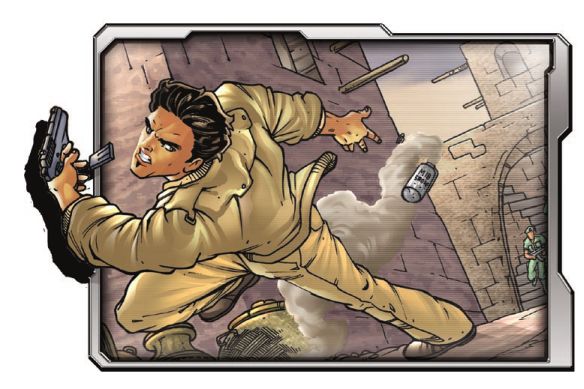
Why is he throwing a grenade like that
Now is Origin , mixed and matched from Talents and Specialties. There's a lot of entries, so get comfy. Also, I'm omitting all the rules bits but be aware there’s lots of stuff here that references mechanics we won't see for a long time.
Talents are natural tendencies and aptitudes.
Adaptable - “You rely on a broad array of tactics rather than a single approach. No matter what happens, you come up with a workable solution – or at least a fair attempt.”
Agile- “You're naturally fast on your feet, an asset that's save you from disaster many times”
Brainy- “You're smarter than most people, possibly because you were raised among academics or had the opportunity to indulge your curiosity about a wide range of subjects.”
Burly- “You're built like a linebacker or can otherwise soak up and dish out punishment when needed.”
Caustic- “Your mouth frequently gets you into hot water, but it just as often saves you from worse punishment.”
Clever- “You're so tricky that you sometimes amaze even yourself.”
Convincing- “Your earnest presence makes you the envy of car salesmen everywhere.”
Cunning- “You survive by your wits, which ensures that they're very, very sharp.”
Daring- “”Leap before you look” is your personal credo. Fortunately, you're unusually fast enough or lucky enough to get away with it. Usually.”
Disciplined- “You're in control of your life at all times and have the drive to accomplish anything to which you set your mind.”
Fierce- “You tend to bull your way through life, counting on your physical presence to carry the day.”
Fit- “You lead a healthy, active life that lets you shrug off illness and other annoyances.”
Gifted- “You're a natural prodigy, capable of amazing accomplishments in your particular field.”
Gonzo- “People wonder if you're a little crazy. You know better- you're a lot crazy.”
Graceful- “You never seem to miss a beat, physically or socially.”
Grizzled- “You're a gruff and intimidating figure, and if the world hasn't killed you yet, it's not likely to do so any time soon.”
Mysterious- “You probably smile a lot – just to make people nervous about your motives.”
Orphaned- “It's a hard life, but somehow, you know you're going to come out on top.”
Persistent- “Dogged and relentless, you keep at any job until it's done.”
Privileged- “Born into wealth, you can't imagine any other lifestyle, nor would you want to.”
Reliable- “A broad base of life experience has prepared you to take on virtually any role in life. You're not flashy, just dependable.”
Resolute- “Once you make a decision, you back it with everything you've got.”
Retired- “You've been there, done that, and printed T-shirts. Now you're back in the game and surrounded by amateurs.”
Rowdy- “”Rebellious” and “Unpredictable” are the words most often used to describe you, but you've seen and done things most people never dream of.”
Shrewd- “You're an expert judge of character and surround yourself with only the very best colleagues.”
Veteran- “You're a seasoned professional with unparalleled insight about your chosen trade.”
Vigilant- “You grew up in a war zone or in other conditions that required your full attention to survive. The experience has taught you to always keep a sharp lookout for trouble”
Witty- “”You can hold your own in any conversation. You are an enchanting dinner companion... and a dangerous one.”
The second part are Specialties , representing experience before getting into the spy game.
Each of these gives a bonus feat and additional minor bonuses.
Authority- “You've carved out a niche as someone with vast reserves of theoretical knowledge. The trick, of course, is applying it in the dangerous situations in which you sometimes become embroiled.”
Celebrity- “You've achieved great notoriety as a performer, athlete, or news pundit, ensuring huge audiences know your name.”
City Dweller- “You are just one of the mission of regular folks who populate a modern metropolis.”
Clergyman- “You're a member of the First Estate, believing that even in these ostensibly secular times, faith is a powerful agent for change.”
Contract Professional- “You've turned your “unique” talents into a brilliant career.”
Criminal- “You've spent a lot of time on the wrong side of the law. You may have done time or you may have been too slick to be caught, but you've never fit in as a law-abiding citizen.”
Doctor- “Whether a neurosurgeon or a veterinarian, your medical skills are always in demand.”
Entertainer- “You have a natural creative talent, such as painting, performance art, or writing, that's earned you a modest following.”
Financier- “You're a shark in the world of high finance.”
Geek- “You're a citizen of the electronic domain, possessing friends and companions around the world, across borders and frequently beyond the law.”
Grifter- “You're a snake-oil salesman, card shark, or small-time con artist, making your living parting the trusting and naïve from their money.”
Hot Rodder- “You're a lover of great speed, pushing the limit at every opportunity.”
Hunter- “As a weekend deer-hunter of full-time safari captain, you're most alive when you're looking through a scope.”
Icon- “They may not know your name, but they'll never forget your face.”
Instructor- “Others may do, but you're quite happy to teach.”
Investigator- “You spend a lot of time looking into other people's business.”
Jack-of-all-Trades- “... And master of some.”
Journalist- “You're a member of the Fourth Estate: a tabloid muckraker, a handsome talking head, a grimy war correspondent, or another faceless newshound. You've got a nose for truth and a strong sense of duty to ferret it out.”
Mercenary- “You are or were part of a private military, in which you learned many practical applications of violence.”
Motorhead- “You've spend most of your life around engines, sometimes as a driver, more often as a mechanic.”
Operative- “You steal and protect secrets for a living- almost certainly for a national power, major corporation, or rogue organization.”
Outdoorsman- “You'll hike for hours, and have spent many nights out under the stars.”
Pickpocket- “You lift wallets and perform other simple street scams.”
Pilot- “Nothing in the world could replace your joy when flying.”
Playboy- “You believe that the party will last as long as the money does- and for you, it seems like the money will never run out.” (This one gives you a henchman)
Recruit- “A military career has taught you a lot about discipline, honor and duty.”
Rescuer- “Paramedic, fireman, search and rescue expert, or old-fashioned cop, you regularly put your life on the line to save others.”
Researcher- “You may be pushing back the scientific frontier or calling years of legal precedent into question; regardless, you work latter-day miracles every day.”
Sailor- “You cannot resist the siren call of the sea.”
Special Ops- “You've honed skills and served causes that may never be made public.”
Spiritualist- “You know there's more to life than the here and now, what you can see and touch. It's knowledge that give you strength.”
Stranger- “You've scratched the surface of the world's unpleasant truths or peeked behind the veil of modern life to see what's really going on. You might be a cult deprogrammer, a hunter of serial killers, or a student of mysteries man was not meant to understand. Now if only you could get everyone to believe you...”
Student- “You're a college student, journeyman, or other young bright-eyed individual studying the world.”
Suit- “You're a corporate warrior, a high-power paper slinger easily weaving your way through organizations.”
Test Subject- “ Things have been done to you in the name of science- strange things you may never understand. You might be the product of a government super-soldier program, rogue genetic research, a fringe group's unorthodox child-rearing theory or another bizarre upbringing. You only survived due to your innate toughness, a trait you retain today.”
Thrill-Seeker- “You're an athlete, jaded millionare or perhaps a careless college student, and have survived stunts that should have left you mangled or dead. You're still in the game, living way out on the edge where you're most at home.”
Tradesman- “You were a blue-collar laborer from a working-class background. Your formative years were probably spent in small towns or working-class communities of major cities, and you have extensive training in the industrial arts.”
Tribesman- “You come from a primitive society, bringing a fresh set of eyes to the modern world.”
Wanderer- “You grew up on the road, perhaps in a tribal caravan or with parents who served overseas. Consequently, you acquired a deep-rooted wanderlust and were exposed to a wide array of foreign cultures at a young age.”
Warrior- “You've dedicated yourself to the serious study of traditional fighting arts, becoming a living weapon against whom many opponents simply cannot defend themselves.”
Mechanics referenced but not encountered yet: interests, class skills, knowledge checks, combat tricks, contacts and connect grades, npc grades, focuses and fortes, wound points, weapon proficiencies, lots of different feats and skills, gear picks, request checks, some combat actions.
For a new player, pretty much all of this is meaningless at this point and lots of these are only slightly different from each other. The fact that they're all descriptive does make it easier to choose without knowing any mechanics, though; just pick one that sounds like it describes your character and worry about it later.
First level characters start at 1000 xp, rather than 0; 0 xp is for special classless “zero level” games. Your level determines the number and size of your action dice, the maximum number of ranks you can have in each of the skills, when you earn feats, weapon proficiencies and interests and the number of Subplots you can have active at once.
Every class has a hit die for the vitality points they get every level, but no squishy wizards here; every class gets a minimum of a d8. All the classes get 4 or more skill points per level, further modified by the character's intelligence and with a list of class skills. They also give weapon proficiencies (only for first level) and gear picks (We’ll see gear later, much later). The class tables also describes the Base Attack Bonus, save modifiers, class defense bonus, initiative modifier and wealth each level of each class grants.
One of the standout features here are the Class “Core Ability.” These are special abilities that a character gains from the first Base and Expert classes they take. The Core Ability gives a class an edge at what they do, so a Soldier X/ Scout Y is not the same as a Scout Y/ Soldier X.
The base classes are the Advocate, Explorer, Faceman, Hacker, Intruder, Pointman, Scientists, Scout, Sleuth, Snoop, Soldier and Wheelman.
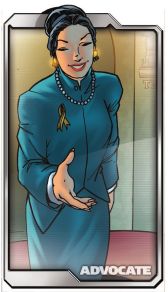
The Advocate is a diplomat and spokesperson, using their dedication and the force of personality granted by their dedication to get things done.
The Advocate Core Ability allows them to spend and roll an action die and “take 10” on that many checks when they need multiple rolls for a task. The rest of their abilities involve a combination of indomitable drive and making use of friends and allies.
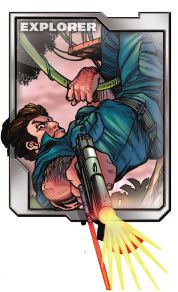
The Explorer is an Indiana Jones-alike, good at going everywhere and being comfortable anywhere.
The Explorer Core Ability allows them to spend an action die and a few hours to find someone who knows someone who has exactly the skills the Explorer needs, pretty much no matter where in the world they are. The other abilities make the Explorer hard to get the drop on and hard to keep down. A fun ability is “The Notebook” where the Explorer writes down all the interesting and unusual things they've encountered, letting them retroactively have prior knowledge applicable to a current problem.
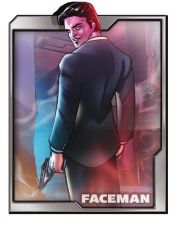
The Faceman is the devious con artist to the Advocates dogged diplomat.
The Faceman Core Ability lets them spend action dice to automatically worse or improve the disposition of an NPC. The other abilities make them masters of disguise and consummate liars, including a high-level ability where they can perfectly imitate another person, and down to an ability that just says, “use their character sheet.”
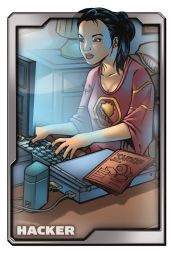
The Hacker is exactly what it says on the tin: the totally awesome computer techie.
The Hacker Core Ability pimps out one computer with all the Hacker's custom software and the rest of the abilities involve mastery of cyberspace. From first level Hackers can never fail Computer checks with a DC less than their level + 20 without an Error, and they become masterful codebreakers.
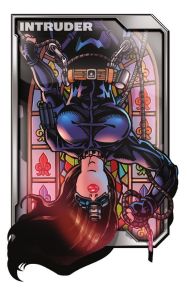
The Intruder is a thief and break-in artist.
The Intruder Core Ability makes them especially quick and nimble, doubling the effect of action dice rolled to improve Dexterity based checks. Other abilities make an Intruder super slippery and ensure they’re never without the necessary tools.
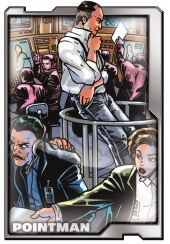
The Pointman is a team leader. They can't do anything any of the other classes can do as well, but can focus to act as a replacement in a pinch. Where they really shine is as a force multiplier, coordinating the efforts of everyone.
The Pointman Core Ability allows them to spend and roll their action dice to improve other people's rolls. The rest of the classes' abilities involve helping the other characters and helping them help each other, while their capstone ability allows them to declare a fortuitous coincidence that occurs right when it's needed.
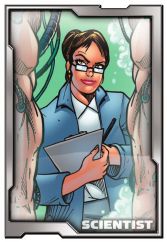
The Scientist is the smarty-pants know-it-all.
The Scientists Core Ability allows the scientists to share some of their expertise, granting a number of their skill feats to the rest of the team. The other Scientist abilities all revolve around being super smart and extremely skilled.
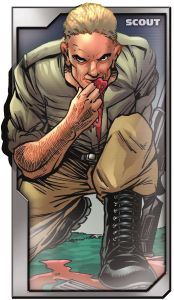
The Scout is the master of the outdoors.
The Scout Core Ability lets the Scout share some of his Terrain feats with teammates. Other abilities allow the Scout to mitigate the dangers and exploit the opportunities of nature and also inflict more damage against unsuspecting enemies with Sneak Attack.
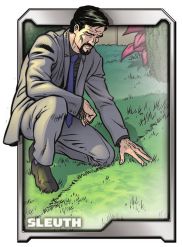
The Sleuth is a detective, using their skills hands-on to figure things out.
The Sleuth Core Abilities doubles any action dice spent to improve any Charisma- or Wisdom-based checks. The rest of the classes' abilities are all about accurately perceiving and analyzing situations. At 10th level, the Sleuth can determine the location of a person, down to a city of 20 square mile area, with just some hours of research and deduction.
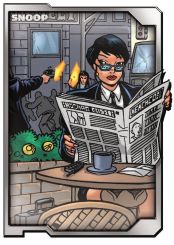
The Snoop is the hands-off counterpart of the Sleuth; where Sleuths uses their own talents, Snoops makes use of advanced technology and analysis techniques to acquire information.
The Snoop Core Ability is identical to the Sleuth one, except replace Charisma-based checks with Intelligence ones. Otherwise, their abilities all involve access to, and expert use of, technological tools. From 10th level the Snoop can have a building or area so thoroughly bugged that everything that happens within is recorded.
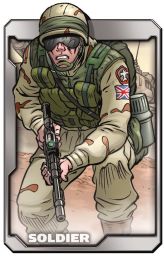
The Soldier is the Spycraft super kill guy. It suffers from (one of the) the Fighter Problem(s) a little bit; where every class has “a small/moderate amount of combat plus other stuff,” the Soldier pretty much has “a moderate amount of combat plus way more combat.” However, the combat abilities are actually good in a world without reality-bending magic users, so if you really need a motherfucker to die, you want a Soldier to make it happen.
The Soldier Core Ability doubles all Action Dice spent to improve attack rolls, while the other Soldier abilities involve resilience in battle and mastery of weapons, armor and tactics.
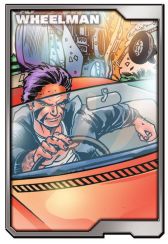
The Wheelman drives the car.
The Wheelman Core Ability doubles Action Dice spent on checks for driving and repair, and the Wheelman's bad rolls are harder for the GC to turn into critical failures while driving or repairing. All the rest of the abilities involve squeezing every bit of performance from their vehicles and keeping them in top condition.
Once you pick a class, you decide on your skills. Your class skills determine which skills your class is expected to have, and you’re punished for going outside these skills by them costing double the amount of skill points. Skills are covered in a later chapter.
You also get a feat of your choice at first level.
Next are Interests . Every character gets at least 2. These are things that a character is into, beyond the stuff their class gives them. A character’s interests can give bonuses to related Knowledge checks, action dice spent to improve a related action, checks to improve the disposition of NPCs with the same interests and you can “indulge” your interest to recover from stress damage faster.
Then there are Subplots , which are character-specific story threads that run through the overarching story.
Subplots are chosen at character creation and between missions, and the number of Subplots that a character can have at one times is determined by their level.
Before a mission, the GC can activate up to one subplot per player, to a max of three, to have them come up during the mission. This grants the GC bonus Action Dice. The GC can also make the Subplot more dangerous for even more Action Dice.
At the end of the mission, a character determines if the subplot was completed, gaining some bonus XP. Each Subplot has requirements to complete. If the character did not complete it, they get a small amount of XP and keep it. If they did, they get more XP and mark the Subplot as completed, allowing them to select another one later.
Characters that have reached a certain level and have completed a certain amount of normal subplots can take a special “Crossroads” version of a subplot. These are much more challenging, character-defining events but grant greater benefits. A character can eventually take up to 4 Crossroads subplots, which permanently grants bonus action dice and and up to 10% extra xp, and a title; one crossroads subplot makes them seasoned,a second weathered,a third hardened and four crafty.
Derived Values
There’s lots of derived valued to determine at the end: Your Vitality and Wound points; Stress and Subdual Damage thresholds; different Attack bonuses; Saving Throw bonuses; Defense; Initiative bonus; Knowledge check bonus and gear check bonuses; reputation/net worth; starting languages.
Action Dice
Now we find out just what Action Dice can do. You can spend Action Dice to:
1. Boost a die roll, rolling one or more of your action dice and adding it’s result to another roll. This is subject to some limitations: you can only spend 1 die to boost a damage roll; you can’t improve a roll that boosts an attribute or provided vitality points; some abilities may have exceptions that disallow spending dice to improve them; you can’t boost anything where no die is actually rolled.
Action dice can be spent even after rolling, before determining the result. Action dice also explode whenever their highest result is rolled.
2. Boost your defense, rolling the die and increasing your defense by 2 for that many rounds. This bonus doesn’t stack with itself.
3. Activate a threat, when you score a Threat on a roll (usually by rolling a 20), improving it to a critical success .
4. Activate an opponent’s error when they suffer an Error (usually by rolling a 1), turning it into a critical failure .
5. Outside combat, you can roll a die to gain that many vitality points, or 2 wound points.
6. Make a request check during a mission to acquire a piece of gear in the field. You spend a number of dice and make a check based on the gear to determine if your allies get it to you.
7. Spend some number of dice for a “hail mary,” to make an untrained skill check without the error penalty, remove the result cap on a skill check, or turn a secret or passive check into an active check.
Some abilities let you roll an extra die whenever you spend an action die. However, you can never roll more than 2 action dice at a time, even if you benefit from multiple of these abilities. The GC can give bonus action dice for things like good roleplaying. These extra dice disappear at the end of the session if they’re unspent but grant a little bonus XP just for earning them.
Expert classes are the Spycraft equivalent of D&D prestige classes. The corebook has the Brawler (an unarmed and improvised weapon master), the Cleaner (hides the truth and keeps secrets), the Con Artists (a grifter and scammer), the Counter-Terrorist (elite urban warrior), the Field Analysts (one man CSI team), the Grunt(Heavy weapons guy), the Guide (really gets around the world), the Illuminatus (secret puppet master), the Inventor(gadgeteer and engineering innovator), the Politico (master of backroom deals and secret friendships), the Raptor (sci-fi ninja), the Schemer (skilled planner and strategist), the Sniper (world class marksman), the Stuntman (risk-taker and edge-liver-on), the Tactician (skilled leader and coordinator), the Transporter (gets things from one place to another. Also, the picture resembles Lewis Black driving a speedboat), the Triggerman (John Woo, the class), the Virtuoso (really super mega good with one skill).
Above even these classes are Master classes, which, we are told, will be introduced in future supplements.
And that's Chapter 1, in Chapter 2 we're introduce to the Skill System.
I got Spycraft long before I became interested in lighter, more "streamlined" games and some parts read like really clumsy (accidental) steps towards games like Fate. Take all the "auto-succeed" abilities a lot of classes get; whereas in Fate you would say, "your character has the 'Ultraleet Hacker'/'The Second Coming of Holmes'/'I am to Spies as Einstein to Ants' Aspect, you automatically succeed because you're so amazing." as a general rule vs Spycraft where a handful of classes have special rules that let them do it, but you still have to roll because there's a 5% chance you auto-fail. The Pointmans Serendipity ability basically give player narrative control, except with a billion restrictions so the GC still maintains almost complete control and lots of wiggle room to shut you down.
Skills
Original SA postTyped out a great post about some of the stuff I actually like about Spycraft, on my phone no less, and fucking lost it.


After character creation is the
Skills
chapter.
Like in standard D20, skill checks are made as a roll of a d20 plus modifier, skills are bought in ranks and add ability modifiers to their rolls.
Spycraft defines three types of skill check. Active checks are ones that the player rolls and has full knowledge of. Secret checks are rolled by the GC and have their results hidden until they become obvious but characters can still take 10/20 on them, boost them with action dice, get synergy bonuses etc. Passive checks are even more restricted, disallowing all of these.
Spycraft has a list of 30 skills: Acrobatics, Analysis, Athletics, Blend, Bluff, Bureaucracy, Computers, Cultures, Drive, Electronics, Falsify, Impress, Intimidate, Investigation, Manipulate, Mechanics, Medicine, Networking, Notice, Profession, Resolve, Science, Search, Security, Sense Motive, Sleight of Hand, Sneak, Streetwise, Survival, Tactics.
You know how some games have kind of vague descriptions for skills, where all the ‘rules’ for some can be summed up as “use this skill to do some stuff!”? Spycraft is not that kind of game. Those 30 skills have between them
86
different skill checks with specific mechanics for using them. The skill descriptions go for nearly
70 pages
. There’s also a table spanning three pages that describes which skills give synergy bonus to which skill checks.
Some of these skills are way to broad for proper
 , like Security and Drive, so they have Focuses, which is a narrower subset of the skill the character is actually competent at. Luckily, they aren't tracked separately so you're as good at Science(Math) as with Science(Genetics). You can also have Fortes, which are focuses you're especially good at and gain a small bonus with.
, like Security and Drive, so they have Focuses, which is a narrower subset of the skill the character is actually competent at. Luckily, they aren't tracked separately so you're as good at Science(Math) as with Science(Genetics). You can also have Fortes, which are focuses you're especially good at and gain a small bonus with.
There are some special rules with skills in general as well:
Skill checks have result caps determined by their rank in the skill used. This means that to be good at a skill means getting ranks to actually be good at the skill, no crazy stacking bonuses here. Rolling a Threat removes the cap, and spending an action die increases the cap by the amount rolled on it.
If a skill check result is 75+, it is a “Triumph”, a display of mastery equivalent to an Olympic record or historic speech. This grants 10% bonus XP to the character and their teammates, and improves the disposition of all the NPCs that witnessed it because it is just that incredible.
There are no “knowledge” skills in Spycraft. Instead, characters have a Knowledge check modifier equal to their Intelligence + total level they use for the same purpose.
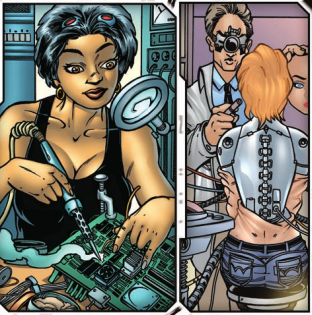
Almost every character showing any cleavage looks like they're wearing a very hardcore pushup bra
Long term skill uses are called Complex Tasks and require 2 to 10 separate checks to complete.
The game provides a long list of "skill tags", generic common effects that modify a check. They are:
Armor Check Penalty (ACP)
- Suffer a penalty based on the armor you wear.
Bribe (BRB)
- You can replace this check with a special Bribe check for the same result.
Complex Task (CMT)
- This check is a complex task, requiring a series of rolls.
Concentration (CNC)
- The check requires absolute attention, preventing taking 10/20, rendering you flat-footed, fails if you take damage and requires 8+ hours of work per day if it takes more than 8 hours to perform.
Cross-Check (XCK)
- This check is a secret check normally, but can be made active by taking x3 as long.
Crowd (CWD)
- Can target 10+ regular NPCs as a crowd, with roll bonus, error range modifier and bribe cost based on the size of the crowd..
Disposition (DSP)
- Modified by the disposition of the target towards you.
Flat-Footed (FLT)
- You're flat-footed if you fail or get an Error when using this skill.
Gear (GER)
- You need certain gear to use this check, and suffer penalties without it.
Gear Only (GRO)
- As above, except that without the gear the check is flat out impossible.
Grasp (GSP)
- You need to handle an object to use this skill. Seriously, they wrote rules for this.
Hands-On (HDO)
- Gotta use both hands.
Hearing (HER)
- This check requires listening. We'll go more over that later.
Language (LNG)
- This check is more difficult if you and the target don't share a common language.
Project Investment (PJI)
- Requires an amount of time and money based on the difficulty.
Remote (RMT)
- This check can affect targets indirectly, ie. through media, intermediares, etc. but has a penalty to do so.
Vision (VIS)
- As hearing, except using the gooey round see-ears in the front of the head.
I was going to list them all out but fuck it; screens instead:
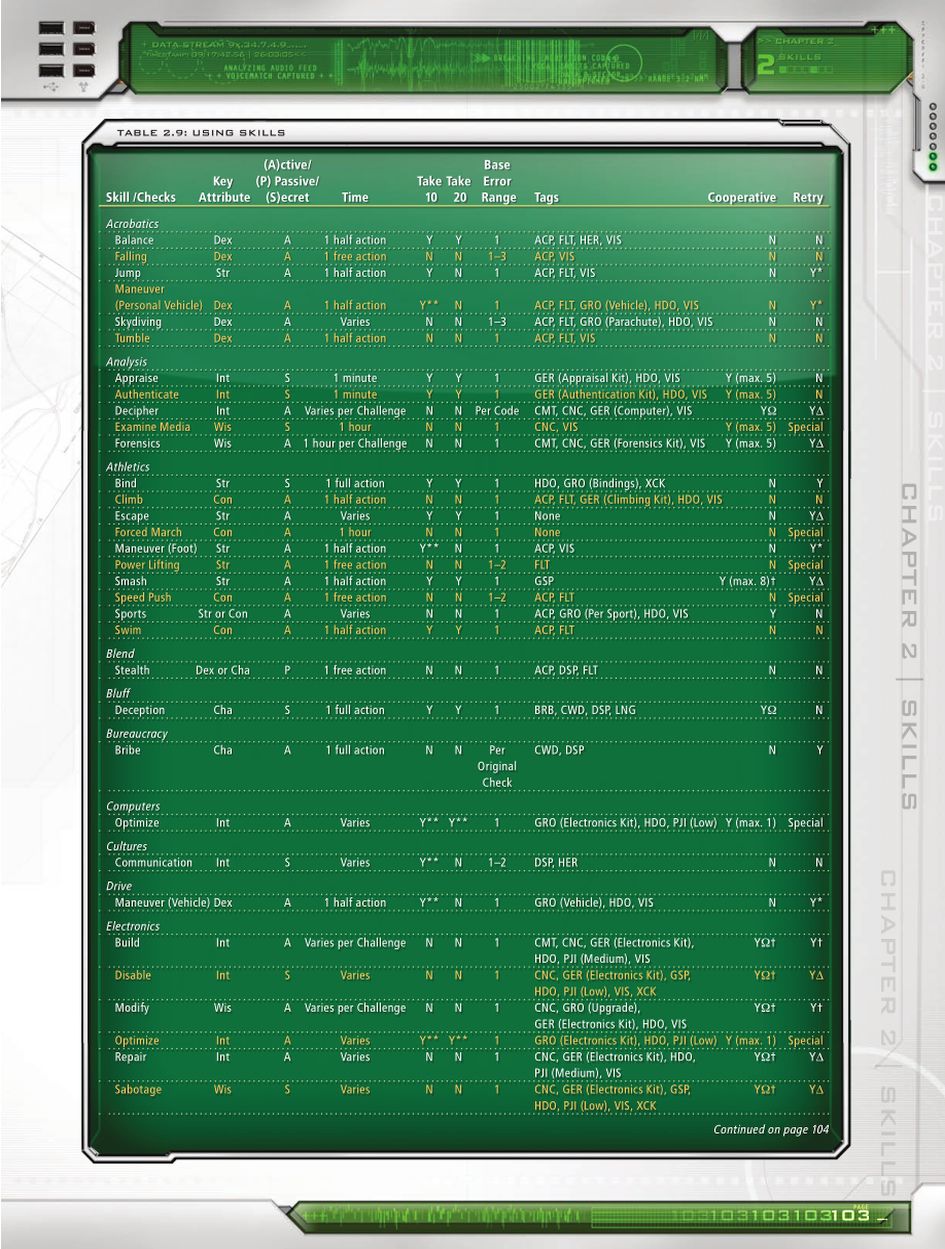
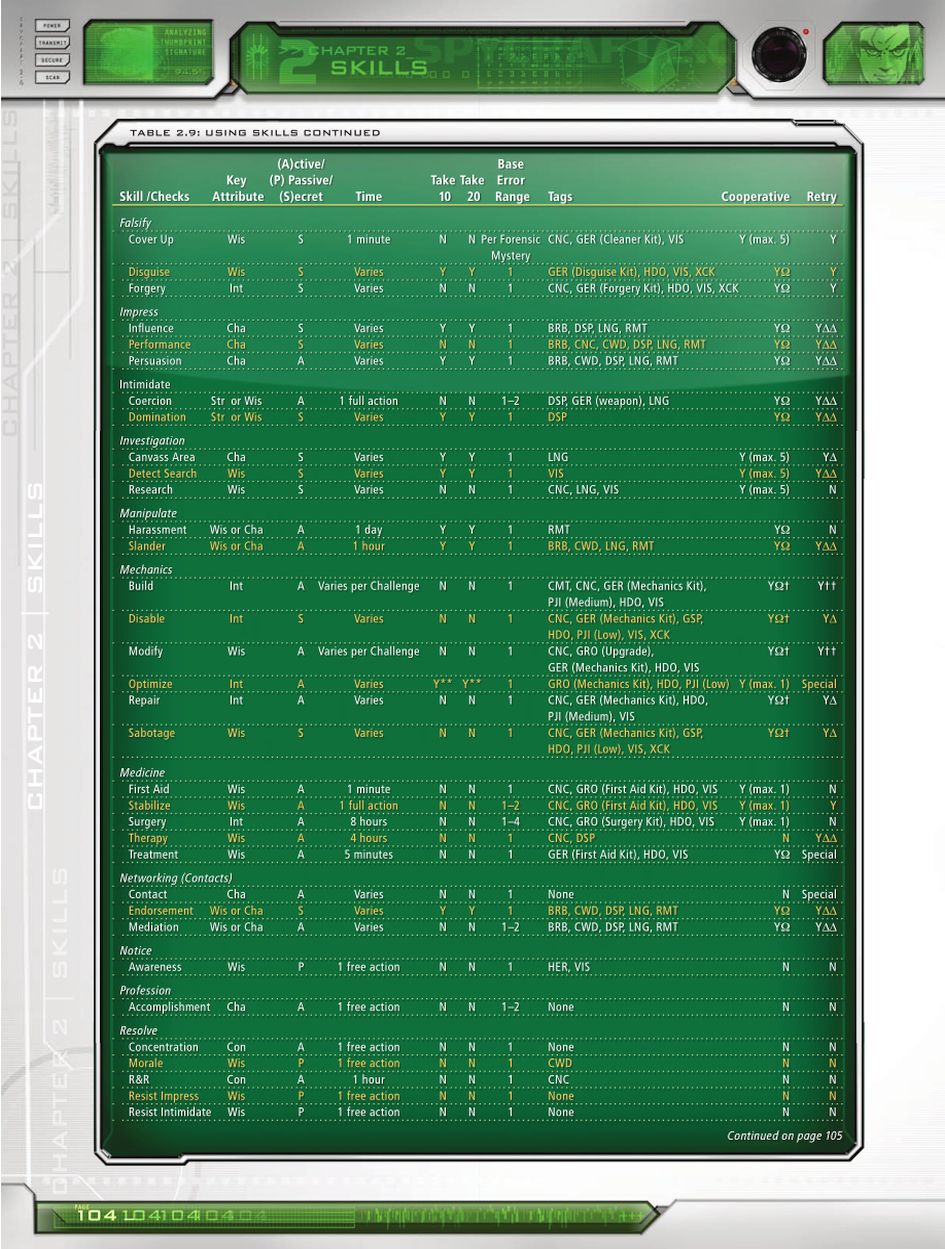
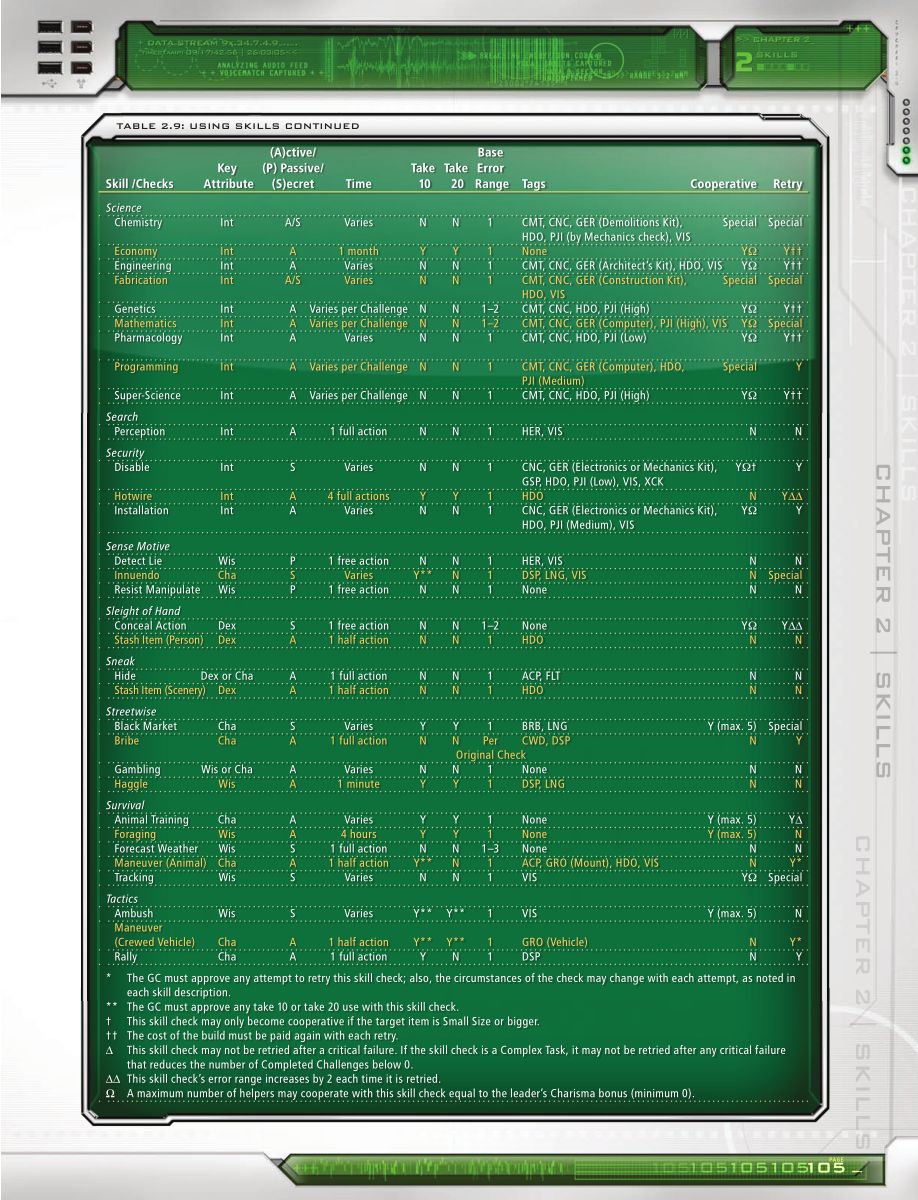
I intended to complain about how ridiculous having
so many
skills is but I looked up the Pathfinder SRD and realized that it actually has
more
skills, counting the knowledge skills (and also that just shy of 1/3 of the Pathfinder skill list is knowledge skills). The Spycraft rules are definitely much more comprehensive.
Actually, I can still complain about it (there are too many skills).
Some standout skill uses:
Athletics check to move faster.
While 3.5 divided stealth into "be unseen" and "be quiet", Spycraft has "passive" Blend and "active" Sneak. I don't know why they're different.
To look for stuff there's "large scale" Investigation and "small scale" search.

Lots of checks involving the manipulation of the opinion of some characters towards others.
Medicine can be used to give a character therapy, removing stress damage.
Science can be used for everything from writing computer software to creating diseases, with the right focus.
Feats
Original SA postMore Spergcraft

Page 171 is the start of the
Feats
chapter
Feats are divided into bunches of groups.
The
Basic Combat
feats also contain lots of special tactical feats that a character gives to their team.
Melee Combat
feats give general melee combat abilities as well as special skills with everything from knives and clubs to polearms and axes. These ones give special combat “tricks” (Moves you can do in a fight) and “stances” (fighting style bonuses). For example, Knife Basics give you a Stance called “Circling Stance” that makes you knife attacks harder to avoid if you have room to maneuver around your enemy and the “Between the Ribs” Trick where you inflict Sneak Attack damage with a special attack.
Ranged Combat
feats serve the same purpose for ranged combat and gives capabilities with automatic fire, close quarters gunfights, long range marksmanship.
Unarmed Combat
feats provide modifiers for all sorts of fighting without weapons. The game provides suggestions for how you can combine feats to emulate various martial arts styles.
Chance
feats manipulate luck, both yours and your enemy’s.
Chase
feats, despite the name, are about all kinds of vehicle operation.
Covert
feats are all about hiding and secrecy. Amusingly, there’s like three feats that are all about knocking out people with surprise attacks.
Gear
feats have to do with making best use of your equipment and your lifestyle.
Basic Skill
feats give general improvements to some of a character's skills. Each provides a +2 bonus to checks with two particular skills and expands their threat range to 19-20, as well as allowing access to the Advanced Skill Feats.
The
Advanced Skill
feats provide a lot of various benefits while using skills.
Style
feats are all about influence. Lots of them give you a network of acquaintances in certain social circles and others modify attempts to influence others.
Terrain
feats involve the environment, from a characters familiarity with it to talent with manhunts (both executing and avoiding).
Tradecraft
feats are those abilities that every master spy needs, from interrogation techniques and cover identities to use of surveillance equipment and analysis.
Spycraft feats are a lot more powerful, flavorful and character defining than they are/were throughout pretty much all of 3.X. Some are still kind of shitty though, like Weapon Focus is in and still dumb and bad.
Gear
Original SA post
Chapter 4 is the Gear Chapter, easily the longest chapter at 100+ pages in an ~500 page book.
The way that Spycraft handles equipment is arguably one of the aspects most different from its progenitor. Everything else is either a modified implementation of something from D&D or an addition that lays on top of it, but this throws pretty much it’s entire way of doing items and equipment out the window and uses something radically different.
Characters get items from three sources: Gear picks, common items and Wealth.
Gear picks are gained from a character’s class levels and divided into Electronic Gear, Gadget, Resource, Security Gear, Tradecraft Gear, Vehicles and Weapons.
Electronic picks are all sorts of electronic items like computers, microphones, radios, etc.
Gadgets are super tech and cutting edge items. The game gives a build your own system for them or in a historical setting getting items more advanced than the time period allows.
Resource picks are lots of support and grab bag selections, ranging from cadavers and crash course training to phone taps, artillery strikes and, my favorite, a bag filled with random guns
Security picks are primarily armor, but also includes drones, invitations to exclusive events and secure lodging.
Tradecraft gear is all sorts of spy stuff like surveillance equipment, legal like as extraditions and pardons, detention for captured individuals at Faction black sites and dossiers.
Vehicles are all forms of transport and the vehicle rule are voluminous and exhaustive.
Weapons are the best way to kill the other guy.
You get Gear picks from your class, based on it's aptitudes. So soldiers get Weapon and Security (for body armor) picks, the Wheelman gets vehicles, and so on. Your Charisma modifier also grants some bonus picks, the types of which are based on your status as a Faction or Freelance character, or costs you some of your class picks if your modifier is negative. Characters can also choose to not select some Gear picks or common items before the mission and keep them as "Reserve" picks they can use during it. During the mission they can make checks to receive (for Gear) or find (for common items) a needed item in the field.
Item picks are also given Calibers, representing how big a deal having them is. For example, a Beretta 9mm handgun is a Caliber I Weapon pick, while a Barrett .50 Rifle is a Caliber V. The game goes over mission Caliber in the GC section, but for now know that the Caliber of a mission determines the maximum Caliber of the gear you can get.
Common items are the random crap that everyone can get, like cellphones and junk.
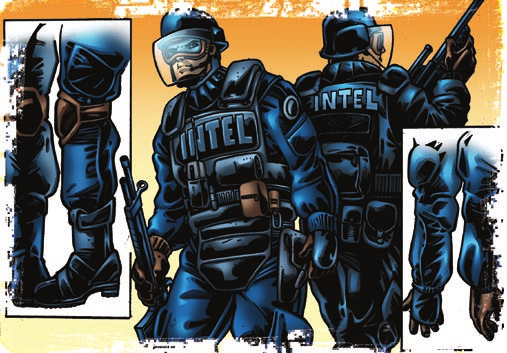
The Intel/AMD rivalry heats up
Character wealth is abstracted by a system called... Wealth. You get a number of Wealth points based on your classes, levels and Charisma. This is divided among your Lifestyle (how awesome you house, car(s) and wardrobe are), Possessions (useful personal Gear you own) and Spending Cash (cash on hand during each mission).
All new characters have a Reputation of 2 with their organization, or, if Freelance, a Net Worth of $100,000, regardless of level, representing their standing within their circles. More is earned by succeeding on missions.
At the beginning of each mission, the team is given a Mission package of equipment necessary for whatever they're doing, they then get to choose Gear picks and common items. This is personalized mission gear provided by your faction/support network and they will expect it back at the end of the mission.
Characters can liquidate Wealth, Reputation or Net Worth, make request checks or sacrifice reserve common items to generate extra spending money, and may burn Reputation/Net Worth to gain an extra Gear pick during a mission.
People say “Gear Porn” for games that have lots of items their characters can use. But they don’t understand. You don’t understand.
But you will. I will make you.
You know some games might have a list of weapons like “light handgun,” “heavy handgun”, “shotgun,” etc.? Yeah, not here:
Guns you can get posted:
Glock 26, Glock 27, Glock 28, Glock 29, Glock 30, Glock 33, H&K P7, Kimber Ultra Carry, Makarov PB, Makarov PM, SiG-Sauer P239, Walther PP/PPK, Beretta 950 Jetfire, Colt Model 1908 Vest Pocket, COP, Inc. COP, General Motors Liberator FP-45, Kel-Tec P3AT, RSA OTs-21, Sharps Model 1A, Beretta 92, Beretta 93R, Colt M1911A1, Distinject Model 35, FN Browning High-Power, FN Five-seveN, Glock 17/17L, Glock 18, Glock 20, Glock 21, Glock 22/24, Glock 31, H&K Mk. 23, H&K USP, Luger P08, Magnum Research Desert Eagle, Ruger Mark III, SiG-Sauer P210, SiG-Sauer P220, SiG-Sauer P226, SiG-Sauer P229, Walther P99/Smith & Wesson SW99. Colt Detective Special. NAA Mini-Revolver. Smith & Wesson J-Frame Bodyguard. Smith & Wesson J-Frame Chef’s Special, Smith & Wesson J-Frame LadySmith, Ruger Super Redhawk, Smith & Wesson Model 500, Smith & Wesson Model 629, Colt Police Positive, Colt Python, Colt Single Action Army, Manurhin MR-73, Taurus Model 608, Webley Mk. 6, C.G. Haenel StG.44, Colt Commando, Colt M16, Colt M16A1, Colt M16A2/M16A4, Colt M16A3, Colt M4/M4A1, Colt M4 SOPMOD, Enfield L85A1/L85A2, FN FAL/FN FAL “Para”, GIAT FAMAS F1/G2, H&K G36, H&K G36C, H&K G36K, H&K G3A3/G3A4, H&K G3SG/1, H&K HK33A2/HK33A3, H&K HK33SG1, H&K HK53A2/HK53A3, NORINCO QBZ-95/QBZ-97, RSA AK-47/AKS, RSA AK-74/AKS-74, RSA AK-101, RSA AK-74U/AKS-74U-UBN, Springfield Armory M14, Steyr AUG, AI AW, AI AW Covert, AI AW-50, AI AWM, AMP DSR-1, Dan-Inject IM, FN Ultima-Ratio Hecate II, FN Ultima-Ratio Mini-Hecate, FN Ultima-Ratio UR Commando II, Lee-Enfield SMLE DeLisle Carbine, Lee-Enfield SMLE Number 1 Mark 3, Lee-Enfield SMLE Number 2, Lee-Enfield SMLE Number 4 Mark I, Lee-Enfield SMLE Number 5, Mauser Model 1898, Mosin-Nagant M1891, Remington 700, Simonov PTRD, Springfield Armory M1903, Weatherby Mark V, Barrett M82A1, H&K MSG-90, H&K PSG-1, KAC SR25, NORINCO KBU-88, RSA Dragunov SVD, RSA SVU, Ruger 10/22, Ruger Mini-14/Mini-30, Simonov SKS, Springfield Armory M1 Garand, Springfield Armory M21, Browning Superposed, Charles Daly Field II Hunter, Savage Arms Model 24, Winchester Model 21, Browning BPS Stalker, KAC Masterkey, Remington 870/870P, Truvelo Neostead, Winchester Model 1897, Benelli Super 90 M1 Practical, Benelli Super 90 M1 Tactical, Benelli M4 Super 90, Browning Auto-5, Daewoo USAS-12, Franchi SPAS-12, Franchi SPAS-15, Reutech Striker, Saiga 12K, CZ Skorpion,H&K MP5K,H&K MP7A1,IMI Micro-Uzi, MAC M10, MAC M11, Steyr TMP, FN P90, German State Arsenal MP-40, H&K MP5A4/MP5A5, H&K MP5SD5/MP5SD6, H&K MP5/10 and MP5/40, H&K UMP, IMI Uzi, IMI Mini-Uzi, RSA Bizon-2, Sten Mk. II/Mk. II(S), Thompson M1928, Browning M1918 BAR,Enfield L86A1 LSW, FN Minimi/Minimi Para, NORINCO QJY-88, RSA RPK/RPK-74, Steyr AUG Hbar, FN MAG, German State Arsenal MG-42, RSA PK, Saco M60, Browning M2hB, General Electric M134, RSA DShK, RSA KPV
Did you give up after the first few lines of that mess? Did your brow furrow and your lip curl a little in disbelief? Did it make you wonder for a moment if perhaps Gear Porn isn’t merely metaphorical?
Now you Understand.
And be aware, this is just the small arms in the book. It doesn’t include vehicle weapons, vehicles, vehicle upgrades , weapon upgrades, body armor, body armor upgrades , melee weapons, artillery, missile launchers, grenade launchers, and more which I won’t add because I’m tired of listing shit right now.
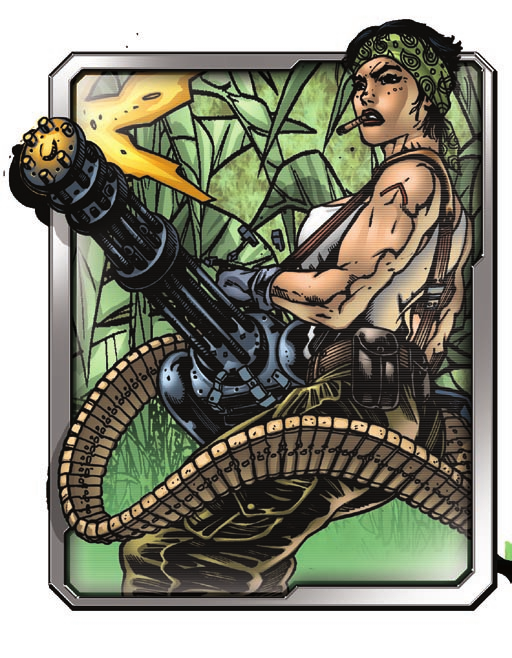
Not quite the Caliber I was talking about
There’s a lot of rules associated with these items as well, the guns alone have a half dozen values like damage, range and ammo capacity without getting into special abilities they can have. Page after page of small print tables with arcane acronyms and numbers.
Fun Gear:
Cadavers.
A swarm of a few dozen random civilians.
Bag of Guns: You are issued a sack of random guns. Literally, you roll some dice for every member of the party to find out what you get.
Like 15 different explosive detonators.
Oh, also there's a table for resistance to damage for everything from paper and pottery to "Military-Grade Alloy."
Multiple types of parachute.
Combat
Original SA postLet's just crank this out.

Combat!
Two big differences from the regular D20 we know and “love” are the fluid initiative, where your initiative score in a round can change based on the actions you take, and armor providing damage reduction instead of making you harder to hit. Other than that, anyone solidly familiar with D20 combat can likely suss out the rest with minimal fuss. There’s a billion different actions you can take and lots of conditions and special rules for different damage types. (The damage from vacuum exposure and lasers have their own damage modifiers, for example)
There are a few noteworthy particulars:
First, there's a table for the starting distance between participants in combat based on terrain.
Critical hits don't do extra damage. Instead there are three possible effects, based on who is getting hit. If a Special Character (including PCs) with any vitality points left is hit, the attacker can spend an action die to inflict damage to Wounds instead, and if the damage exceed the targets Constitution, two dice may be spent to cause a critical injury. With no Vitality, the damage automatically goes to Wounds and a critical injury requires only one die.
Against Standard Characters (Mook NPCs), vehicles and items, one to four dice can be spent and each causes them to be affected as though they had failed that many damage saves along with having to roll normally to resist the damage.
Spending no dice on a Threat means it stays only a Threat.
There's a table for what happens on critical misses based on the number of dice spent to activate it and the type of attack.
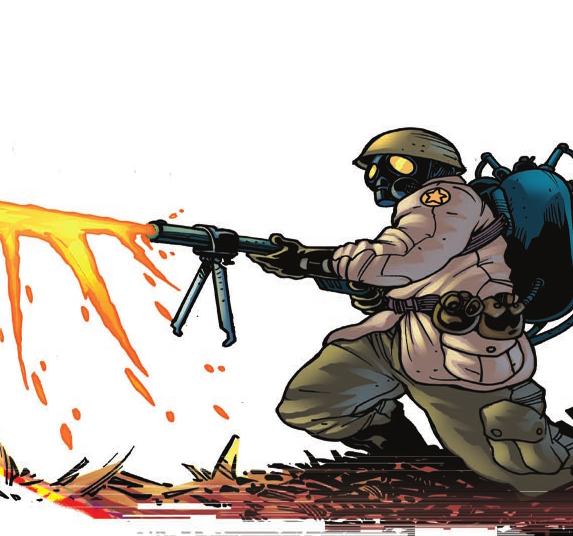
Fucking fire
Characters with Vitality and Wounds don't suffer any effect from damage until any of the following occur:
- Being reduced to 0 Vitality or losing any Wounds makes you fatigued.
- Unconscious at 0 Wounds, dying a -1 or lower, dead at -10 and body destroyed at -25.
- With 25+ damage in a single hit, make a Fort save or take a critical injury, if the damage is 50+ you also start dying on a failed save.
Standard NPCs just have a damage save to resist damage, instead of having to track Wounds and Vitality. This doesn't cut down on bookkeeping however, because each save is made against the total amount of damage they've taken in combat, so

There's special rules for lots of different damage types:
Acid
for corrosive substances.
Bang
is for things like the disorienting effects of sudden loud noises like flashbangs.
Cold
damage for temperatures below freezing.
Collision
damage from things running into other things.
Contagion
damage from poison, disease, radiation and chemicals.
Electrical
damage shocks the fuck out of you.
Explosive
damage from bombs and what not. Spreads out and lessens with distance.
Falling
damage from... guess.
Fire
damage for burnin'.
Flash
damage for blinding and disorienting lights.
Heat
damage is the opposite of cold, for temperatures over 90 Fahrenheit.
Laser
damage, for lasers, which cannot be dodged. :science101:
Sneak Attack
damage is this seriously a special damage type, what the hell.
Stress
damage for when the rat race just starts getting to you.
Subdual
damage is non-lethal.
Vacuum
damage IN SPACE.
Table for hearing and vision modifiers. For example, in "Dim" light, a character's "Visual Increment" is reduced by 30ft. (In Spycraft, perception checks are affected by range the same way attack rolls are.)
Lots of different actions, including different ones for punching and kicking.
Dramatic Conflicts
!
These rules are for non-combat conflicts that are important enough to warrant some more attention than just a complex skill challenge.
Each dramatic conflict has a Predator and Prey, the sides seeking to achieve something and avoid it, respectively. How close they are is represented by Lead. The predator wins at 0 Lead and the prey at 10.
The dramatic conflicts are
Chases
(predator is trying to catch the prey),
Brainwashing
(the predator seeks to alter the mind of the prey),
Hack
(the predator tries to compromise a computer system guarded by the prey),
Infiltration
(the predator wants to worm their way into the working of the prey organization),
Interrogation
(the predators try to extract information from the prey),
Manhunt
(the predator is looking to track down the prey) and
Seduction
(the predator seeks to subvert and co-opt the prey).
Each conflict has its own skills and Strategies that each side can use. Each round, each side in the conflict picks a Strategy and makes a roll with a skill determined by the strategy and with results set by the same. The winner gets to select Advantages that can give Lead to various side advantages.
There are mechanics for organizations, including the faction that Faction-affiliated characters work for.
Organizations have five ratings: Goals, History, Tools, Image and Sites.
Goals
are what the organization seeks to achieve . The organization can provide members involved in activities related to their Goals extra action dice. These range from skill checks to triggering events in the game.
History
is important events that shaped the organization. Members gain bonuses to action dice rolls for certain skill checks based on the history of their organization.
Image
is how well known the organization goals, methods, leaders, members and sites are. This can either protect members via good public reputation or help them remain secret.
Sites
are important locations and facilities for the organization,providing bonuses to request checks and reducing the time for them.
Tools
increase the access to high quality equipment an organization's members have. Normally, members are limited to a maximum caliber of II. Each point of Tools let's the organization increase this maximum caliber in two gear categories.
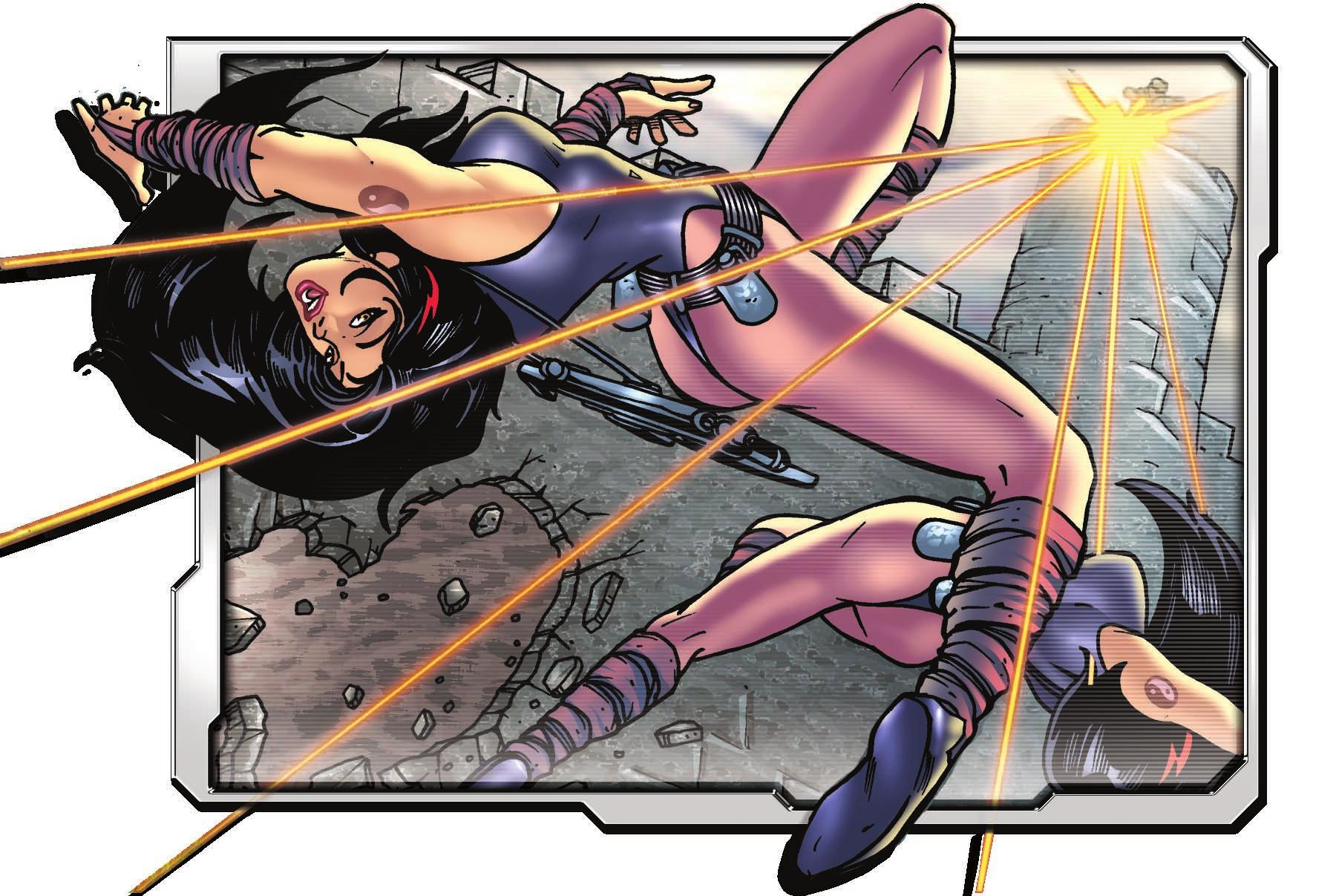
Fanservice ninja twins
Finally is
Chapter 7
for the Game Control.
Some of the stuff in here is hilarious. There's a lot of rules in here that, for another game, would just be advice and suggestions.
Starting off, we soon learn what the GC can spend their action dice on:
- Boosting an NPC roll or defence.
- Boosting the DC of a roll.
- Activating an NPC threat or enemy error.
- Heal an NPC.
- Promote a standard NPC to a special character.
-
Save a Special NPC from death or capture.
-
Add a campaign quality.
-
Prompt a dramatic scene.
Also...
Spycraft 2.0 posted:
spend action dice to prompt “events,” impromptu
obstacles and crises that make the player characters’ lives more
interesting. Events are incredible GC tools, allowing him to nudge the
players when they grow idle, shake up a flagging scene, or respond
to in-game events with logical consequences.
Campaign qualities for customizing your game along with particular combination of qualities for certain genres.
Guidelines for designing missions and RULES for deciding the objective of the mission. For example, maybe they need to succeed on a skill check, how will you ever decide what the DC of that check should be? Don't worry, Spycraft has you covered.
Lots of XP modifiers and Reputation/Net Worth penalties for certain secrecy requirements. Add a time limit? Rules for giving more XP.
The NPC system is actually pretty neat. Cross reference the average level of the party with the 'grade' from 1 to 10 of the NPC in six areas (initiative, attack, defense, resilience, damage save/Vitality and Wounds, and skill competence modifiers) throw on some qualities that give special effects, done. Grades are relative measures, so that grade I is always crummy, from levels 1 to 20, while X is always bad ass.
Spycraft 2.0 posted:
"Friends help you move, real friends help you move bodies.
Disposition is a mechanic where the opinion of an NPC to another character modifies their actions and attempts to manipulate or persuade them.
The dispositions go from Helpful (most positive), Supportive, Friendly, Intrigued, Neutral, Aloof, Unfriendly, Hostile, Adversarial (most not positive). Each applies modifiers to "intimacy checks" (attempts to deceive or coerce), "fondness checks" (attempts to persuade), loyalty checks (who they side with if forced to choose out of combat), if and who they help in a fight and how long skill checks with the "Disposition" tag targeting them take.
Contacts!
Contacts are people you know, that know other people that know skills/have connections you need.
Finally we cap off the book with generic advice.
Analysis
What strikes me as so
 about Spycraft isn't that it's ultra mega
about Spycraft isn't that it's ultra mega
 because there's lots of other games that double down on that much, much more. Instead, it's because there are a lot of things that feel much more innovative mechanically but seen though a very bizarre lens. Like the abilities I mentioned back in the section about the classes, which I call "never-fail" abilities because they cause you to automatically succeed at certain routine checks in areas your class should be exceedingly competent in. This is basically the idea of "Say Yes or Roll the Dice" put in a form that's comprehensible to someone who can't
conceive
of the idea that a player might say "I do X" and the GC going "Okay."
because there's lots of other games that double down on that much, much more. Instead, it's because there are a lot of things that feel much more innovative mechanically but seen though a very bizarre lens. Like the abilities I mentioned back in the section about the classes, which I call "never-fail" abilities because they cause you to automatically succeed at certain routine checks in areas your class should be exceedingly competent in. This is basically the idea of "Say Yes or Roll the Dice" put in a form that's comprehensible to someone who can't
conceive
of the idea that a player might say "I do X" and the GC going "Okay."
Is this the mindset that the writers had creating it, or that they thought their target audience would have playing it? Almost certainly not. But it's still true because Death of the Author.

Another unusual things is the way that certain GC things that should exist "behind the curtain" are restricted by rules. Like, there are rules that are supposed to be followed to have something unexpected happen in the game. Why should there be any kind of game-defined process for that? This is distinct from lots of rules-as-physics
 games where the game world that the characters exist in has very intricate rules governing it and the expectations the game gives for the meta realm that the players inhabit can be summed up as "do whatever."
games where the game world that the characters exist in has very intricate rules governing it and the expectations the game gives for the meta realm that the players inhabit can be summed up as "do whatever."
In Summary
Spycraft is weird, and owns.